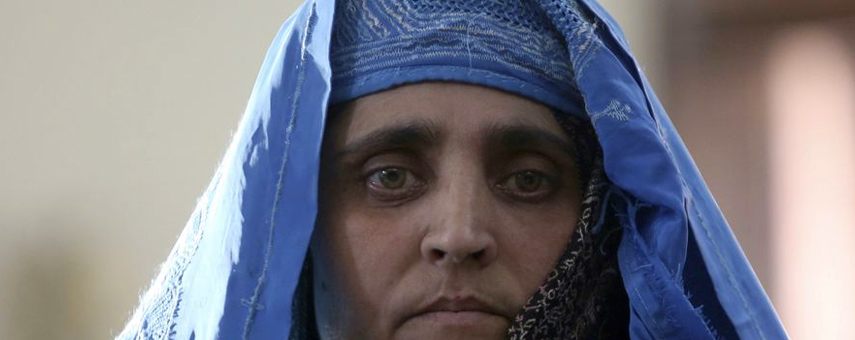Pakistan recently faced a PR nightmare when Sharbat Gula – the once famous National Geographic Afghan girl – was deported to her native Afghanistan. Gula was accused of forgery, living in Pakistan using fake identity, and thus was not only detained, but was later sent back to Afghanistan.
Gula first gained international prominence in 1984 as an Afghan refugee girl, after Steve McCurry’s photograph of her – with striking and unique green eyes, was published on the cover of National Geographic. Her portrait, as National Geographic claims, became a symbol for refugees all over the world. She then resurfaced in 2014, but accusations of forging her identity documents sent her back into hiding.
This incident too turned international media attention on Pakistan, and yet again, for all the wrong reasons. The western media cried foul over the apparent “injustice” with Sharbat Gula and her family, yet there was rarely a mention of the illegitimacy” of Gula’s stay in Pakistan.
What the western media also ignored was that most Afghan refugees returning home are facing financial and residential struggles. Whereas, Gula not only visited the Presidential Palace and had a one on one meeting with President Ashraf Ghani, but was also fortunate to receive a furnished apartment from the Afghan government.
Even though this seemed more like a PR exercise by Kabul, none of the media outlets questioned Ghani and his government over the adverse circumstances faced by the rest of the refugees. Afghan media’s reaction to this story was nothing short of displaying Pakistan in poor light internationally, without acknowledging that hundreds of thousands of Afghan families are not only legally based in Pakistan, but also earn their livelihoods.
Soon after Gula landed in Afghanistan, the narrative among the general Afghan population and the Afghan media was that of “Gula treated with disgrace in Pakistan”. Yet, many Afghans were unaware that both the provincial government of Khyber Pakhtunkhwa, and federal government in Islamabad agreed to help Gula and challenged the court’s decision against her deportation. Also, the narrative in Afghanistan also excluded the fact that many Afghans, holding legitimate proof of ID, are living in Pakistan without facing the threat of deportation.
Gula’s story was also another case of “larger than life” storylines in the western media about the misery of someone only when they needed them. A similar example was that of the Syrian boy, Omran, sitting mortified in an ambulance after losing his family in the ongoing Syrian conflict. Before or after that story, there were rarely any mentions of the misery of Syrians in any prominent media outlets with such a magnitude or scale. Gula’s case is also somewhat similar, as before her deportation, none of these media outlets published stories, or made efforts to highlight the plight she might be living in. Additionally, in the month of November alone, Turkey, Iraq, South Sudan, and Syria have had more than a dozen deadly terror attacks, killing scores; yet these stories could only make it to the back pages of all media networks as the US Presidential election enjoyed a higher coverage in comparison.
Various human rights groups joined the chorus with the western media against the “grave injustice” committed by the Pakistani authorities against Gula. Champa Patel, Director South Asia of Amnesty International, voiced her discontent by arguing that Gula’s deportation would tarnish Pakistan’s status of a generous host. Yet, her statement disregards over two decades of efforts that Pakistan has put in to accommodate a fair share of 3 million Afghan refugees. A single case, based on media profile and hype, tarnishing a country’s image sounds less than rational.
It would also be unfair to criticise Gula in this whole episode as her only aim was to survive as a widow, while raising her four children. Yet, she committed a procedural mistake by not availing the first Afghan refugee census, conducted in 2006, which could have enabled her to stay in Pakistan legally.
Yes, Pakistan might (and should) have created an exception for Sharbat Gula. Yes, Gula’s case demanded more compassion than reason. And yes, apparent mishandling of Gula’s case might have brought shame to Pakistan in the western media circles. But the story, which gained global attention, should also generate debates on how western media picks and chooses people, groups, and topics according to their need and appetite, and ignore their miseries when the stories might not contain “buzzworthy” appeal.
The author, Farooq Yousaf, is a Research Fellow and a Programme Consultant at CRSS. He is currently pursuing his PhD in Australia.

